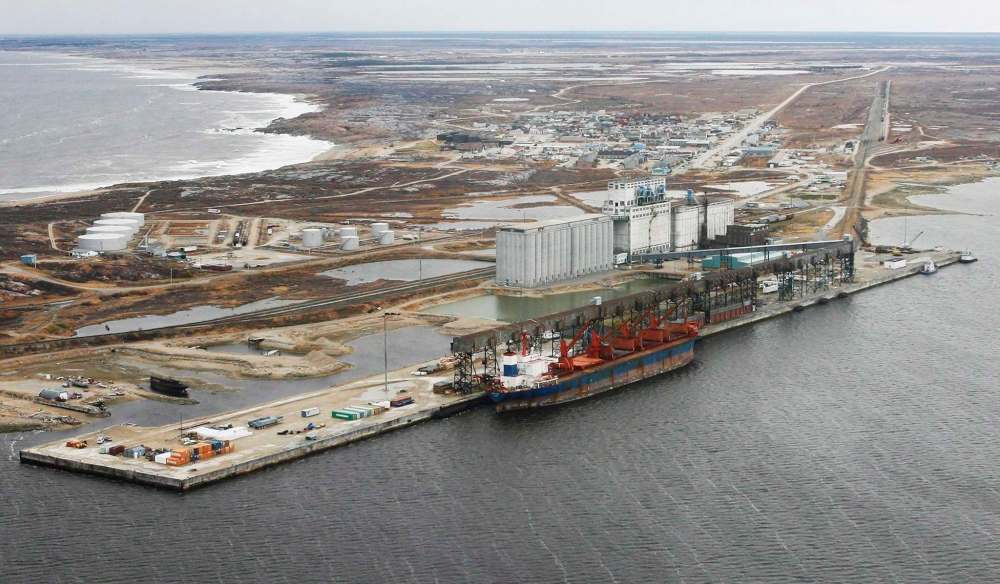‘Largest challenge we ever faced’
Churchill residents caught in crossfire as questions swirl over Ottawa's handling of rail crisis
Advertisement
Read this article for free:
or
Already have an account? Log in here »
To continue reading, please subscribe:
Monthly Digital Subscription
$0 for the first 4 weeks*
- Enjoy unlimited reading on winnipegfreepress.com
- Read the E-Edition, our digital replica newspaper
- Access News Break, our award-winning app
- Play interactive puzzles
*No charge for 4 weeks then price increases to the regular rate of $19.00 plus GST every four weeks. Offer available to new and qualified returning subscribers only. Cancel any time.
Monthly Digital Subscription
$4.75/week*
- Enjoy unlimited reading on winnipegfreepress.com
- Read the E-Edition, our digital replica newspaper
- Access News Break, our award-winning app
- Play interactive puzzles
*Billed as $19 plus GST every four weeks. Cancel any time.
To continue reading, please subscribe:
Add Free Press access to your Brandon Sun subscription for only an additional
$1 for the first 4 weeks*
*Your next subscription payment will increase by $1.00 and you will be charged $16.99 plus GST for four weeks. After four weeks, your payment will increase to $23.99 plus GST every four weeks.
Read unlimited articles for free today:
or
Already have an account? Log in here »
Hey there, time traveller!
This article was published 16/11/2017 (2939 days ago), so information in it may no longer be current.
OTTAWA — Questions about Ottawa’s handling of Churchill’s rail line crisis ricocheted among federal departments Wednesday, as the representatives of the northern Manitoba town asked the provincial government to help find a solution.
In a claim filed Tuesday under the North American Free Trade Agreement, Hudson Bay Railway ownerOmnitrax said it will sue Ottawa for $150 million if arbitration doesn’t result in a settlement that sees the flood-damaged line repaired and transferred, along with the Port of Churchill, to a private consortium for a negotiated amount.
Also Tuesday, Ottawa proceeded with an $18.8-million lawsuit to claw back funds it provided under a 2008 agreement to improve the transportation link.

Churchill Mayor Mike Spence gathered 100 of the town’s 900 residents for a meeting Tuesday night, where they shared months-old concerns about rising food and gas prices, and unemployment.
“This is the largest challenge we’ve ever faced,” said Spence, one of three main people behind the consortium to which the government is trying to transfer the railway and port.
“We have a federal commitment that this wouldn’t derail negotiations.”
Omnitrax’s NAFTA filing contained multiple allegations the Free Press could not verify.
One claim, not previously reported, was that the federal granting agency Western Economic Diversification “strung Omnitrax along” this spring, after it requested funds to help deliver 350,000 metric tonnes of grain from producers to the Port of Churchill, prior to the rail line’s May 23 washout.
Spence said he’d never heard of a proposed shipment, especially after Denver-based Omnitrax laid off the bulk of its port workers in July 2016.
The size of the purported shipment would have been almost double the amount the port had shipped out in 2015.
The office of federal Innovation, Science and Economic Development Minister Navdeep Bains refused to confirm the allegation.
“Our government is actively supporting the community of Churchill to address immediate needs and resulting economic impacts,” wrote spokesman Karl Sasseville.
“Given the legal nature of the notice of intent we will not be offering comment at this time.”
Other points raised in Omnitrax’s filings remain unconfirmed, from whether Transport Canada had low-balled the value of the rail line and port, to why other funding programs fell through.
Five hours after receiving an email, Transport Canada told the Free Press the questions surrounding NAFTA would have to be handled by the foreign affairs ministry.
In Winnipeg, provincial Infrastructure Minister Ron Schuler stressed the rail line and port fall under federal regulation.
He repeatedly refused to say whether Manitoba considers Churchill a strategic asset.
“We need to know from the federal government: do they see the Port of Churchill as a national strategic asset?”
Schuler said his government supports Ottawa’s legal action against Omnitrax, but hasn’t said whether the province will sue the company for the $20 million it gave Omnitrax under a separate 2008 contract.
“We understand the frustration in Churchill,” Schuler said. “We are getting supplies up there.”
Though Omnitrax called on the provincial government to join Ottawa in arbitration under NAFTA, Schuler claimed it falls outside provincial jurisdiction, adding the Pallister government would like to do so.
“Nobody here is new to lawsuits — they tend to include everybody. Omnitrax has cast a wide net.
“As much as I’d like to weigh in on this, I’m going to be careful; we’re going before the courts.”
But Spence said Churchill will soon reach out to the province, both to help get through the winter and to find a viable solution.
“The province can be a part of it, at the end of the day,” he said.
Meanwhile, Niki Ashton, the MP for northern Manitoba, says her area’s plight calls for a symbolic response.
Wednesday afternoon, she called on the University of Winnipeg to strip the honorary doctorate it awarded to Omnitrax founder Pat Broe in 2008.
“He was given the doctorate because of his commitment to our north. But his company has since shown nothing but disrespect to the people of northern Manitoba,” Ashton wrote in a press release.
“The people of Churchill and our north have suffered enough due to Pat Broe’s actions.”
The university could not be immediately reached for comment.
— with files from Nick Martin
dylan.robertson@freepress.mb.ca



